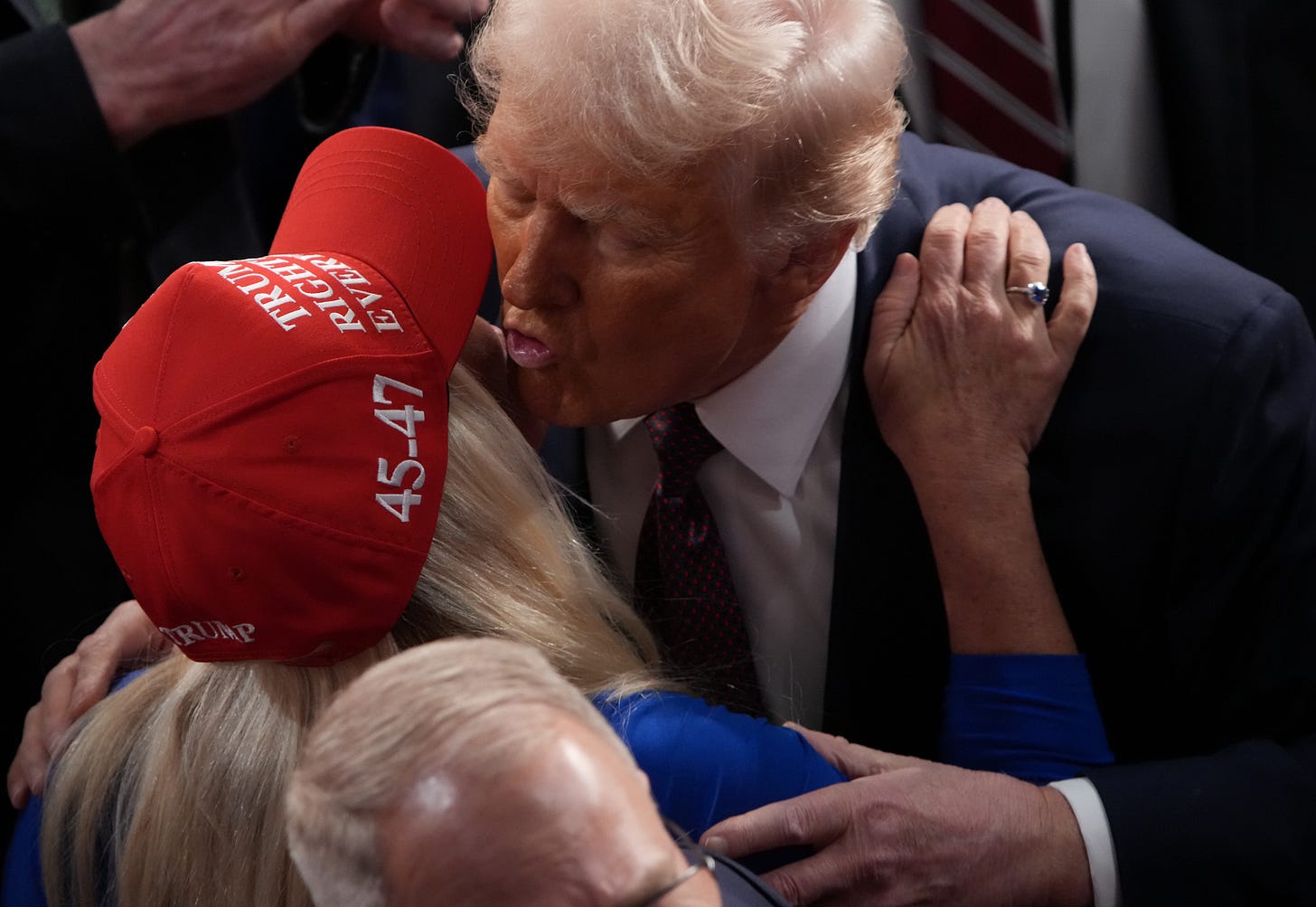Why MAGA is coming apart at the seams
Turns out they're not in it for Trump, they're in it for themselves.
🚨 PN Black Friday special offer 🚨 Click the button below to sign up for an annual paid subscription for the special Black Friday price of $40 ⬇️
Happy Thanksgiving weekend, dear readers!
The MAGA movement has always been defined by faith and loyalty: Faith in Donald Trump and his power to remake the world, and loyalty toward him in all things, even when his words and actions might lead some to doubt.
Now, however, their faith is being tested and their loyalty is wavering.
In part, this is a rather simple story about failure and weakness. It’s not hard to keep a movement together when it’s succeeding, but when the ship begins taking on water, the crew starts looking for lifeboats to jump into. But even more fundamentally, the events of the last few weeks demonstrate that MAGA was always a more rickety craft than it appeared.
While the fissures have been building for months, last Friday was a particularly disorienting day for the MAGA faithful.
That afternoon, Trump had an Oval Office meeting with Zohran Mamdani, in which rather than calling the New York mayor-elect a vile communist destined to destroy the city of Trump’s birth, the president couldn’t have been friendlier.
“I think you’re going to have hopefully a really great mayor,” Trump said. “The better he does, the happier I am, I will say.”
This sent supporters reeling; Steve Bannon shared a long lament about how “heartbroken” Trump’s base was, and a Fox Business analyst posted “I really think the wheels are coming off the Trump presidency.”
Then that evening, Rep. Marjorie Taylor Greene, as pure a creation of the Trump era as exists in Congress, not only announced that she is leaving the House but excoriated Trump in the process. After she angered him repeatedly in recent weeks, Trump called her a “traitor” and withdrew his endorsement of her. So Greene said she didn’t want to force her constituents to endure the “hateful” primary campaign Trump would wage against her.
“I refuse to be a battered wife hoping it all goes away and gets better,” said the congresswoman who for years has been one of Trump’s most vociferous advocates.
Loyalty not guaranteed
Never in modern times has a president enforced absolute loyalty in the way Trump does, not only by attempting to destroy any Republican who opposes him but by demanding regular public displays of sycophancy, such as the North Korean-style cabinet meetings in which everyone competes to see who can offer the most effusive praise of the president’s magnificence.
For the most part, it has worked: The atmosphere of fear surrounding Trump’s cult of personality has kept Republicans from criticizing him even when they think he’s wrong.
But consider the list of issues on which notable Republican officeholders and influencers are now breaking with Trump, or at the very least fighting amongst themselves in ways that weaken his movement:
After months of resisting the release of the Epstein files, Trump faced a revolt from his own party in Congress, where both houses voted nearly unanimously for a bill to force a release, which he signed.
Ideas Trump has floated recently, including 50-year mortgages and $2,000 checks given to Americans supposedly from tariff revenue, have landed with a thud in Congress, with few members coming out to back them. His demand to eliminate the filibuster has received little support from Republicans in the Senate.
Trump’s apparent interest in invading Venezuela has caused a negative reaction from supporters who believed him when he said he wanted to break with our history of foreign adventurism. Republican officeholders have begun raising questions about the Pentagon murdering alleged drug smugglers by the dozens without providing any evidence of who they were or what legal authority the administration is operating under. Sen. Rand Paul, for instance, says “I think you’ll see a splintering and a fracturing of the movement that has supported the president” if he invades Venezuela.
While Republican legislators in many states saluted and followed his order to redraw their congressional maps, Republicans in Indiana said no despite intense pressure from the White House. While it received less coverage, Republicans in Nebraska and Kansas also declined to redraw their maps to eliminate Democratic seats.
Trump has cheerleaded the unfettered development of artificial intelligence, but many on the right are wary of the technology and the tech companies creating it; when news broke that he wants to prevent any state from adopting AI regulations, state-level Republicans pushed back.
The right is currently being torn apart over the question of how friendly it should be to Nazis; while Trump’s own position on the question is a bit muddled, his administration is teeming with white nationalists.
Some Republicans are even worried about backlash from the administration’s nationwide campaign of masked thuggery; in response to the recent invasion of North Carolina, former Gov. Pat McCrory told Politico, “From a PR and political standpoint, for the first time, immigration is maybe having a negative impact on my party.”
Punchbowl News reports that MTG’s displeasure is just the tip of the iceberg in the Republican caucus in the House. The White House, one anonymous GOP member told them, “has treated ALL members like garbage … More explosive early resignations are coming. It’s a tinder box. Morale has never been lower.”
The most immediate explanation for why all this dissension and displeasure is roiling to the surface is that Trump is extremely unpopular right now — especially on the economy, the issue every elected official rightly fears.
A note from Aaron: Working with brilliant contributors like Paul takes resources. If you aren’t already a paid subscriber, please sign up to support our work 👇
In a recent CBS News/YouGov poll, 65 percent of respondents said Trump’s policies are making grocery prices go up, and only 36 percent approve of his handling of the economy. Trump’s approval is hovering around 40 percent in most polls. It’s easy to stand behind a president when he’s winning; it’s something else when his policies are unpopular and he looks like a loser.
In an environment in which all politics is national, loyalty to the president is both more important and more fragile. When the president struggles, members of Congress are dragged down with him, and they feel an urgent need to distinguish themselves. When they start to break with him, that only makes him look weaker.
To make it worse, the political press loves stories of intraparty conflict, as all those “Dems in Disarray” headlines testify. But now it’s the Republicans in disarray, and their internal conflict will continue to generate media attention.
The split between elite MAGA and mass MAGA
The widening fissures demonstrate something important about how this movement is constructed.
Though in all his elections Trump got plenty of votes from people who aren’t particularly devoted to him — they didn’t like his Democratic opponents, or they were mad about deindustrialization, or they figured he’d shake up the system — the red-hatted Trump cultists have always drawn our attention, in part for their sheer maniacal flamboyance. Those are the ones he was talking about when he said he could shoot someone on Fifth Avenue and they’d never leave him, and he was right.
They view him as anointed by God, and almost god-like himself; they’ll follow him through any political folly, change of policy position, or new infantile squabble. But those are voters; when it comes to the elite figures who are vital to the MAGA movement — elected officials, conservative activists, media influencers — they came to Trump and stayed with him not because they worship him no matter what, but because allying with him serves their own ends.
Maybe they’re with him because they genuinely want to see something like fascism, and they correctly saw that he was the one who would deliver it. Maybe they felt that they could exercise more influence in his presidency than in any other. Maybe they saw Trump as a vehicle to achieve the policy and cultural realignment they were after. Maybe they realized that their constituents love him, and so being a lieutenant in his army was the way to guarantee their own success.
The higher you go up the political ranks, the more likely it is that people will see Trump not as an object of idolization but as a tool for them to achieve their own goals; they follow him only so long as they’re something in it for them.
You can see it in Marjorie Taylor Greene: She started as a Trump cultist, born of the online fever swamps and QAnon chat rooms. But then she became a member of Congress with her own political goals and ideas. Once she moved up the ladder, the greater the odds became that she would eventually break with Trump.
Of course, there is still plenty of risk for any Republican in defying Trump. But the farther he falls and the more erratic he becomes, the more that calculation shifts toward the place where it’s every Republican for themselves.
The arc of the last Republican president’s appeal may be instructive here. After the September 11 attacks, George W. Bush’s approval rose to a remarkable 90 percent, and for years afterward he inspired an extraordinary degree of loyalty among Republicans. But after the disastrous Iraq War and the economic cataclysm of 2008, his ratings plunged into the 20s, lower than any president since Richard Nixon in the depths of Watergate. By the time he left office, Republicans who had stood proudly by his side acted as though they never liked him in the first place.
It’s far too early to know if that will be Trump’s fate as well. But unless he manages some remarkable turnaround in the public’s esteem, Republicans will continue to edge away from him, and his problems will only grow.
That’s it for today
We’ll be back with a special Saturday edition tomorrow. If you appreciate today’s PN, please do your part to keep us free by taking advantage of our Black Friday special offer and signing up for a paid subscription.
Thanks for reading and for your support, and if you’re in the States, have a great holiday weekend.







Post‑Trump GOP looks less like a party and more like a talent show for shamelessness. Marjorie Taylor Greene isn’t an outlier, she’s the blueprint…proof that when spectacle pays dividends, it becomes the business model.
The farce of justice I’ve written about is the same farce at play here: cruelty rewarded, dignity dismissed, and the stage lights never dim.
—Johan
As I was reading the Article in Wired that you referenced, it occurred to me that these dark, off the books, coalition of self interest groups are so often referred to as “think tanks”. That term gives them some undeserved aura of legitimacy. These “think tanks” really are white collar gangs. They don’t “shoot people on 5th Avenue”; instead, they kill people by sucking up money so that a family cannot afford cancer treatment for their daughter.